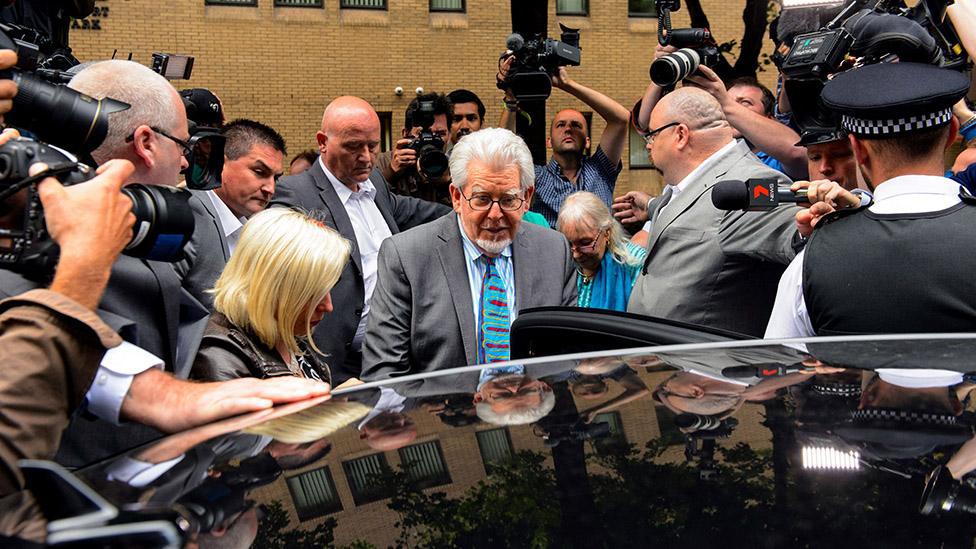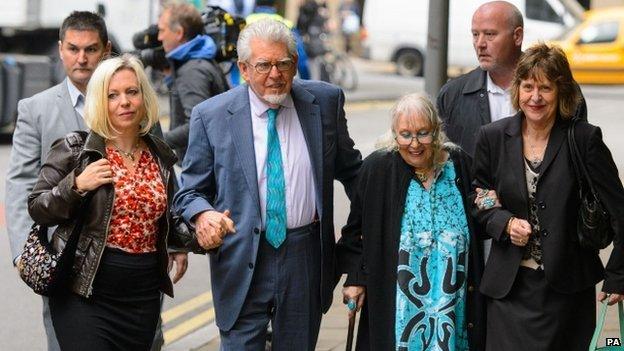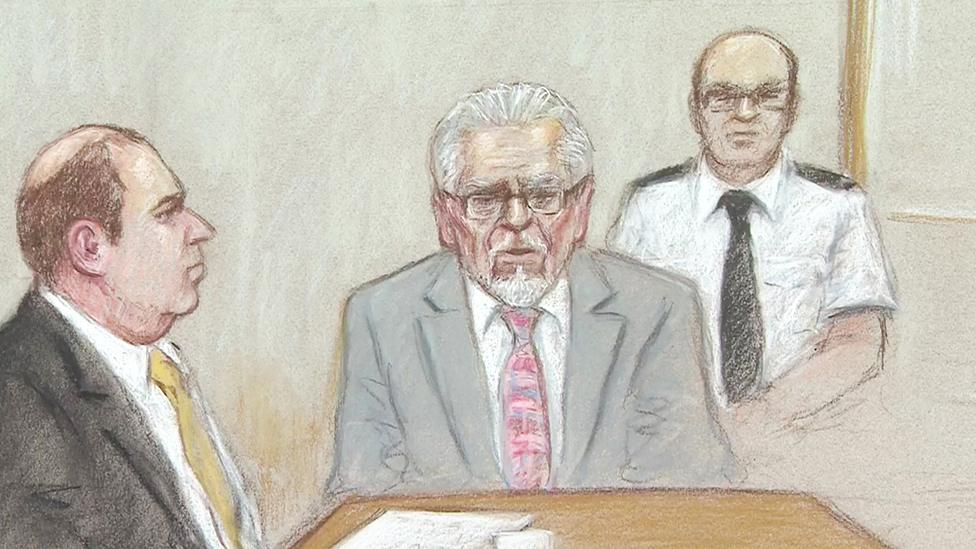Rolf Harris: The trial that sealed a predator’s fate
- Published

Rolf Harris leaves Southwark Crown Court after being found guilty
The disgraced entertainer Rolf Harris has died at the age of 93. Callum May, who sat through the entirety of Harris's 2014 indecent assault trial, recalls a prolific abuser whose attempts to varnish his reputation ended in failure.

Rolf Harris spent the last years of his life waging a public relations campaign to distract from his record as a wretched, desperate sexual predator.
One of his convictions was overturned and he was cleared of others after two trials. But his 11 convictions remained for the indecent assault of three women, one of whom was a friend of his daughter who he invited into his home when she was a child.
Harris was brought to justice in 2014, in one of the prosecutions brought by the Metropolitan Police's Operation Yewtree - an investigation into historic behaviour by celebrities.
Drama surrounded each day of his first trial at Southwark Crown Court. His family attempted to put on a united front, holding hands together for the cameras as they apparently travelled to court together. But this was later labelled an elaborate show by the prosecution - it turned out his daughter Bindi was joining her father only for the last few moments of their journey.

Rolf Harris would arrive at court with family members - but the prosecution said this was a "staged" entrance
It was in front of about 50 lawyers, journalists and a public gallery fascinated by the highest-profile Operation Yewtree trial that Rolf Harris was questioned by his barrister Sonia Woodley.
Harris's appearance in the witness box was, in part, a reminiscence about his long career as a singer and cartoonist that was designed to entertain the jury. "In 1959," said Woodley at one point, "did you invent something called the wobbleboard?" Harris said he had done. He went on to sing a few lines of his 1965 hit Jake the Peg.
Two executives from the now-collapsed public relations firm Bell Pottinger lurked in the court's public areas to offer "help" to journalists covering the case.
But none of this could diminish the testimony of women who had got to know Rolf Harris when they were young. His main victim had known Harris and Bindi well from childhood.
The court heard that Bindi's friend was first abused by Rolf Harris on a holiday to Hawaii, when she was 13. Over time, he groomed her and repeatedly abused her until she was in her mid-20s.
"[His victim] had been totally controlled by Rolf Harris," prosecutor Sasha Wass told the court. "He knew that he could have access to her intimately whether there were people around or not."
By the time she was 29, she had developed a drink problem, which she blamed on Harris's abuse. At this point the woman told her family what he had done to her. The family's furious reaction culminated in a visit by Harris to the woman's village in the English countryside.
"She said she was disgusted by what he had done," Wass said, "and she hit him about the head."
The woman then made him walk around the village, knowing he would be recognisable in public. Wass said: "She continued to berate him, not caring about the embarrassment."

Harris appeared in the witness box during his 2014 trial
In court, Harris's defence case was that the abuse she said took place when she was under age had never happened, and that sex between them took place later and was consensual.
After the confrontation in the village Harris never spoke to the woman again, but wrote a pleading letter to her father:
"I would like to talk to you to apologise for betraying your trust and for unwittingly so harming your darling [daughter]. I know that what I did was wrong but we are, all of us, fallible and oh how I deluded myself. Please forgive me, love Rolf."
Others knew Harris only fleetingly. Four women were named on the charge sheet. His conviction for the indecent assault of one of them was overturned on appeal.
More women gave evidence about his character. There was a family friend who said Harris had told her in 1969, when she was 12: "Come here, I want to be the first one to give you a tongue kiss," and did so, terrifying her.
A dancer from New Zealand said Harris had groped her as a 17-year-old in 1970; a holidaymaker said Harris took her to the back room of a Maltese bar the same year and assaulted her.
A production worker on an Australian TV show of Harris's, Tony Porter, flew to London to tell the trial about the time he saw the entertainer grope a make-up artist. As he did so he "made a lascivious noise with his mouth", said Porter.
One woman fought back tears as she recounted the story of how she suffered sexual assault at the hands of Harris when she was aged 14 and in London on a theatre trip in 1986.
Harris produced a list of witnesses from the world of entertainment - the presenters Sue Cook and Rosemarie Ford, and a BBC executive producer, Tina Fletcher-Hill, who said that while he was tactile and friendly with colleagues, he was not an abuser.
At the Court of Appeal, his lawyers argued that prosecutors should not have relied on a legal concept called cross-admissibility. The argument ran that a number of independent complaints demonstrated a pattern of behaviour by Harris, and so the jury must believe them.
When Harris's conviction on one count was quashed, his defence said all the others should be overturned because the unsafe conviction "had the effect of poisoning the minds of the jury" when they considered the other verdicts.
But the appeal judges said: "The subtraction of a single allegation does not in our view have significant impact where there was abundant remaining evidence."
Rolf Harris's attempts to remain in the public's memory as an artist and entertainer failed. His obituaries will contain the detail of his offences above everything else.